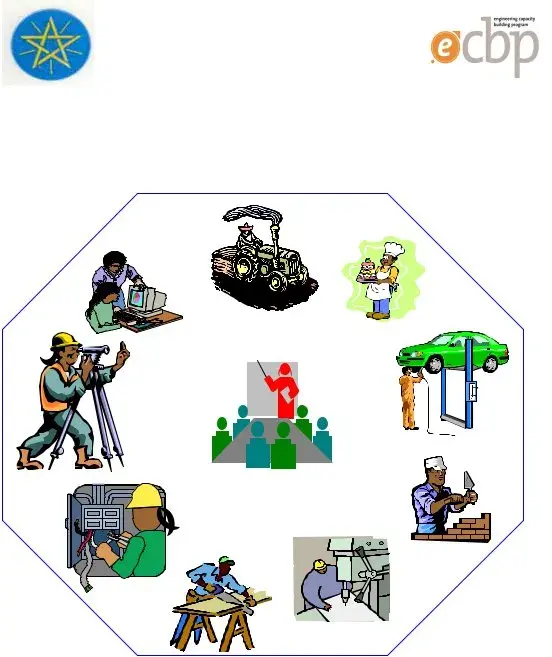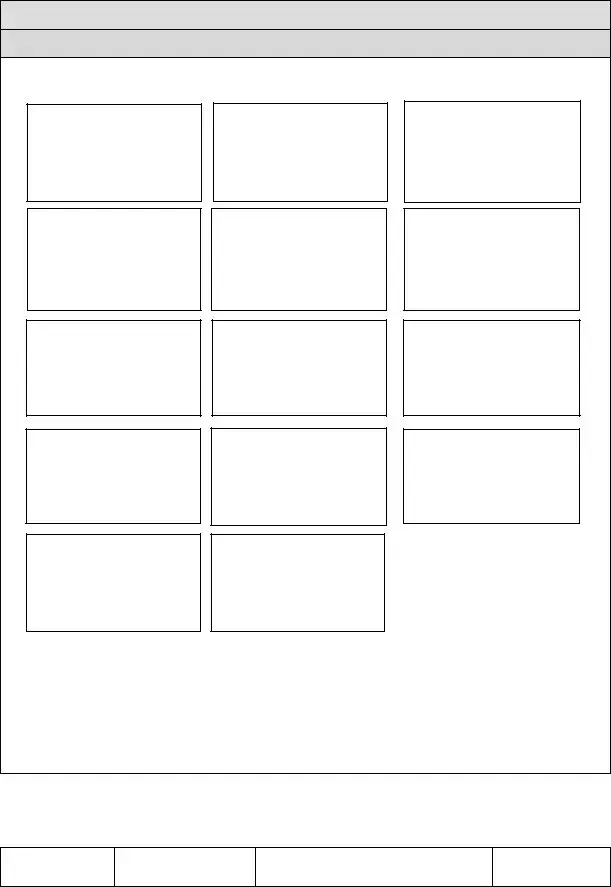The Basic Account Work Level 2 form, stemming from the Federal Democratic Republic of Ethiopia's efforts to revamp its Technical and Vocational Education and Training (TVET) System, embodies a national endeavor to align with international standards and practices while fostering technology transfer. Developed within the Ethiopian Occupational Standards (EOS) framework under the Ministry of Education's guidance in August 2012, this form serves as a foundational pillar in Ethiopia's National TVET-Strategy and the National TVET-Qualification Framework (NTQF). It meticulously outlines the occupational standards for basic accounting, aiming at equipping individuals with the necessary competencies and skills to thrive in the financial services sector. Detailed through Units of Competence, the document encapsulates various essential elements such as the occupational title, NTQF level, unit code, unit title, and a comprehensive unit descriptor alongside performance criteria, indicating the expected outcomes. Further, it encompasses variables, range statements, and an evidence guide facilitating assessors in the evaluation process. The content is methodically segmented to offer a chart displaying an overview of all Units of Competence relevant to the occupation, foundational competencies from effective communication in the workplace to developing and using a savings plan, and an occupational map catering to TVET providers and individuals with career path information. This document not only signifies a step towards educational reform but also delineates a structured pathway for achieving proficiency in basic account works at NTQF Level II.
| Question | Answer |
|---|---|
| Form Name | Basic Account Work Level 2 Form |
| Form Length | 61 pages |
| Fillable? | No |
| Fillable fields | 0 |
| Avg. time to fill out | 15 min 15 sec |
| Other names | coc accounting level 2 pdf, accounting level 1 coc exam pdf, coc exam in ethiopia download pdf, accounting coc level 1 pdf |

Federal Democratic Republic of Ethiopia
OCCUPATIONAL STANDARD
BASIC ACCOUNT WORKS
NTQF Level II
Ministry of Education
August 2012

Introduction
Ethiopia has embarked on a process of reforming its
The Ethiopia Occupational Standards (EOS) is the core element of the Ethiopian National
This document details the mandatory format, sequencing, wording and layout for the Ethiopia Occupational Standard which comprised of Units of Competence.
A Unit of Competence describes a distinct work activity. It is documented in a standard format that comprises:
•Occupational title, NTQF level
•Unit code
•Unit title
•Unit descriptor
•Elements and Performance criteria
•Variables and Range statement
•Evidence guide
Together all the parts of a Unit of Competence guide the assessor in determining whether the candidate is competent.
The ensuing sections of this EOS document comprise a description of the respective occupation with all the key components of a Unit of Competence:
•the chart with an overview of all Units of Competence for the respective occupation including the Unit Codes and the Unit Titles
•the contents of each Unit of Competence (competence standard)
•occupational map providing the technical and vocational education and training (TVET) providers with information and important requirements to consider when designing training programs for this standards, and for the individual, a career path
Page 1 of 60
Ministry of Education
Copyright
Basic Account Works
Ethiopian Occupational Standard
Version 2
August 2012

UNIT OF COMPETENCE CHART Occupational Standard: Basic Account Works
Occupational Code: EIS BAW
NTQF Level II
EIS BAW2 01 0812
Work Effectively in the
Financial Services
Sector
EIS BAW2 02 0812
Work Effectively with Others
EIS BAW2 03 0812
Use Business Technology
EIS BAW2 04 0812
Process Customer Accounts
EIS BAW2 07 0812
Develop
Understanding of
Taxation
EIS BAW2 05 0812
Process Customer Transactions
EIS BAW2 08 0812
Develop and Use a Personal Budget
EIS BAW2 06 0812
Develop
Understanding of the
Ethiopian Financial
System and Markets
EIS BAW2 09 0812
Develop and Use a Savings Plan
EIS BAW2 10 0812
Develop
Understanding of Debt
and Consumer Credit
EIS BAW2 13 0812
Develop Business Practice
EIS BAW2 11 0812
Participate in Work Place Communication
EIS BAW2 14 1012
Apply Continuous
Improvement
Processes (Kaizen)
EIS BAW2 12 0812
Work in Team Environment
Page 2 of 60
Ministry of Education
Copyright
Basic Account Works
Ethiopian Occupational Standard
Version 2
August 2012

Occupational Standard: Basic Account Works Level II
Unit Title |
Work Effectively in the Financial Services Sector |
Unit Code |
EIS BAW2 01 0812 |
Unit Descriptor |
This unit describes the performance outcomes, skills and |
|
knowledge required to correctly interpret and apply industry and |
|
organisation procedures, guidelines, policies, ethical standards |
|
and sustainability requirements to |
|
services industry. |
Elements |
|
Performance Criteria |
|
|
|
|
|
1. |
Work within |
|
1.1. Guidelines, procedures, legislation and codes of |
|
financial services |
|
|
|
|
practice applying to the financial industry are identified and |
|
|
industry |
|
|
|
|
the effects on everyday work determined |
|
|
guidelines, |
|
|
|
|
|
|
|
procedures and |
|
1.2. Workplace procedures and instructions for environmentally |
|
legislation |
|
sustainable work practices are recognized and followed |
|
|
|
and any potential improvements suggested to appropriate |
|
|
|
personnel |
|
|
|
1.3. Work tasks are carried out in accordance with specific |
|
|
|
organization policy, guidelines and procedures |
|
|
|
1.4. Work tasks are undertaken to meet the organization |
|
|
|
philosophy, values and objectives in relation to customer |
|
|
|
service, professional practice and ethical principles |
|
|
|
1.5. Assistance in clarifying the application of the guidelines, |
|
|
|
procedures and legislation is sought from appropriate |
|
|
|
personnel where necessary |
2. |
Communicate in |
|
2.1. Effective listening and speaking skills are used in verbal |
|
the workplace |
|
|
|
|
communication |
|
|
|
|
|
|
|
|
2.2. Instructions or enquiries are responded to promptly and in |
|
|
|
accordance with organizational requirements |
|
|
|
2.3. Presentation of written information is conducted to meet |
|
|
|
organizational standards of style, format and accuracy |
|
|
|
2.4. Communication is used to develop and maintain positive |
|
|
|
relationships, mutual trust and confidence |
3. |
Work safely |
|
3.1. Established safety procedures are followed when |
|
|
|
|
|
|
|
conducting work |
|
|
|
3.2. Designated persons are identified for reporting queries and |
|
|
|
concerns about safety in the workplace |
|
|
|
3.3. Actions are taken to eliminate workplace hazards or to |
|
|
|
reduce risk |
|
|
|
3.4. Organizational procedures are followed for responding to |
|
|
|
emergency incidents |
Page 3 of 60
Ministry of Education
Copyright
Basic Account Works
Ethiopian Occupational Standard
Version 2
August 2012

4. |
Use workplace |
4.1. Relevant information management systems and databases |
|
technology |
|
|
are accessed and used according to organizational |
|
|
|
|
|
|
procedures |
|
|
4.2. Proprietary or organizational software is used effectively |
|
|
to develop workplace documents, input and extract data and |
|
|
make calculations |
5. Work in a team |
5.1. Support to team members is provided to ensure work |
|
|
environment |
|
|
group goals are met |
|
|
|
|
|
|
5.2. Constructive contribution is made to work group goals and |
|
|
tasks |
|
|
5.3. Information relevant to work with work group is shared to |
|
|
ensure designated goals are met |
|
|
5.4. Opportunities for improvement of work group activity are |
|
|
shared with work group members |
6. |
Develop effective |
6.1. Work and personal priorities are identified and planned to |
|
work habits |
|
|
achieve a balance between any competing priorities |
|
|
|
|
|
|
6.2. Time management strategies are applied to work duties |
|
|
6.3. Appropriate dress and behavior codes are followed as |
|
|
required by the workplace, job role or customer contact |
|
Variable |
|
Range |
|
|
|
|
|
|
|
Guidelines, |
|
• |
|
|
procedures, |
|
• |
Electronic Funds Transfer (EFT) code of conduct |
|
legislation and codes |
|
• |
relevant environmental legislation |
|
of practice may |
|
• |
Finance code |
|
include: |
|
||
|
|
• |
Financial Services Reform Act (FSRA) |
|
|
|
|
||
|
|
|
• Financial Transaction Reports Act |
|
|
|
|
• Industry codes of practice |
|
|
|
|
• legislation covering competition, prudential regulation |
|
|
|
|
• |
|
|
|
|
|
Acts. |
|
Environmentally |
|
• |
improving energy efficiency |
|
sustainable work |
|
• |
increasing use of resources that are: |
|
practices include: |
|
|
renewable |
|
|
|
|
recyclable |
|
|
|
|
reusable |
|
|
|
|
recoverable |
|
|
|
• recognising opportunities to reduce emissions of greenhouse |
|
|
|
|
|
gases |
|
|
|
• Reducing use of |
|
|
Appropriate |
|
• |
Colleagues |
|
personnel may |
|
• |
human resources staff |
|
include: |
|
• |
managers or supervisors |
Page 4 of 60
Ministry of Education
Copyright
Basic Account Works
Ethiopian Occupational Standard
Version 2
August 2012

|
• |
mentors |
Organisation policy, |
• |
best practice guidelines |
guidelines, and |
• |
organisation and customer charters |
procedures may |
• |
organisation codes of practice |
include: |
• |
complaint and grievance procedures |
|
||
|
• |
customer services statements |
|
• |
induction program |
|
• |
industry policy documents |
|
• |
industry procedures manuals |
|
• |
operating manuals |
Organisation |
• |
best practice guidelines |
philosophy, values |
• |
organisation and customer charters |
and objectives may |
• |
guidance from supervisor |
include: |
• |
vision and mission statements |
|
||
Verbal |
• |
answering enquiries from clients |
communication may |
• |
answering telephone calls |
include: |
• |
informal discussions |
|
• |
requests from colleagues |
|
• use of voice mail |
|
Standards may |
• |
ethical behaviour expectations |
include: |
• |
legislation |
|
• organisational policies and procedures |
|
|
• |
specified work standards |
|
• standards set by work group |
|
Safety procedures |
• |
completing required documentation |
may include: |
• |
displaying health and safety brochures, magazines and other |
|
|
material |
|
• following OHS guidelines relevant to workplace |
|
|
• keeping workplace clean and tidy |
|
|
• City administration, Regional and Federal State legislation |
|
|
• |
office practice manual |
|
• undergoing operator training when using new equipment or |
|
|
|
processes |
Designated persons |
• |
designated health and safety officers |
may include: |
• |
managers |
|
• other persons authorised or nominated by the enterprise or |
|
|
|
industry |
|
• |
supervisors |
|
• |
team leaders |
Risk is: |
• |
The chance of something occurring in the workplace or when |
|
|
carrying out job role activities that could result in injury or |
|
|
damage to self or others. |
Proprietary or |
• |
client contact systems |
organisational |
• |
custom designed financial software |
software may include |
• |
databases |
|
• |
spreadsheets |
Page 5 of 60
Ministry of Education
Copyright
Basic Account Works
Ethiopian Occupational Standard
Version 2
August 2012

|
• |
word processers |
Support to team |
• |
explaining and clarifying |
members may |
• |
helping colleagues |
include: |
• |
problem solving |
|
• |
providing encouragement |
|
• providing feedback to a team member |
|
|
• undertaking extra tasks if necessary |
|
|
|
|
Evidence Guide |
|
|
|
|
|
Critical aspects of |
Evidence of the ability to: |
|
Competence |
• |
apply broad understanding of the relevant financial industry |
|
|
and the way it operates to work to be carried out |
|
• access, interpret and comply with organisation policy and |
|
|
|
procedures |
|
• communicate effectively with others and act as an effective |
|
|
|
team member |
|
• use proprietary and industry specific software effectively in |
|
|
|
|
|
• interpret and comply with relevant workplace legislation and |
|
|
|
codes of practice |
|
• perform work within a quality customer service environment |
|
|
• work in a safe and environmentally sustainable manner |
|
Underpinning |
Demonstrates knowledge of |
|
Knowledge and |
• |
ethical principles that apply to work in the financial services |
Attitudes |
|
industry |
|
• industry and organisation policies and procedures |
|
|
• questioning and listening techniques |
|
|
• relevant environmental and resource efficiency systems and |
|
|
|
procedures for own work area |
|
• relevant knowledge of industry codes of practice |
|
|
• relevant legislation and statutory requirements that impact on |
|
|
|
the industry, including occupational health and safety (OHS) |
|
|
and sustainable practices |
Underpinning Skills |
Demonstrates: |
|
|
• |
communication skills to: |
|
|
determine and confirm work requirements, using |
|
|
questioning and active listening as required |
|
|
seek help if required |
|
|
liaise with others, share information, listen and understand |
|
|
use language and concepts appropriate to cultural |
|
|
differences |
|
• numeracy and IT skills to: |
|
|
|
undertake basic financial calculations |
|
|
access and use appropriate software such as word |
|
|
processors, spreadsheets and databases |
|
|
access and use internet information |
|
• |
literacy skills to: |
|
|
|
Page 6 of 60
Ministry of Education
Copyright
Basic Account Works
Ethiopian Occupational Standard
Version 2
August 2012

|
read and interpret documentation from a variety of sources |
|
and record, gather and consolidate basic financial |
|
information |
|
draft basic documentation |
|
• teamwork skills to work effectively and cooperatively with |
|
others |
|
• planning and organising skills to implement environmental and |
|
energy efficiency policies and procedures relevant to own |
|
work area |
|
• organisational skills, including the ability to plan and sequence |
|
work |
|
• learning skills to maintain knowledge of changes to |
|
organization and industry operational requirements, ethical |
|
behaviours and expectations |
Resources |
Access is required to real or appropriately simulated situations, |
Implication |
including work areas, materials and equipment, and to |
|
information on workplace practices and OHS practices. |
Assessment Methods |
Competency may be assessed through: |
|
• Interview / Written Test / Oral Questioning |
|
• Observation / Demonstration |
Context of |
Competency may be assessed in the work place or in a |
Assessment |
simulated work place setting. |
Page 7 of 60
Ministry of Education
Copyright
Basic Account Works
Ethiopian Occupational Standard
Version 2
August 2012

Occupational Standard: Basic Account Works Level II
Unit Title |
Work Effectively with Others |
Unit Code |
EIS BAW2 02 0812 |
Unit Descriptor |
This unit describes the performance outcomes, skills and |
|
knowledge required to work in a group environment promoting |
|
team commitment and cooperation, supporting team members |
|
and dealing effectively with issues, problems and conflict. |
Elements |
|
Performance Criteria |
|
|
|
|
|
1. |
Develop effective |
|
1.1. Own responsibilities and duties are identified in relation to |
|
workplace |
|
|
|
|
workgroup members and activities are undertaken in a |
|
|
relationships |
|
|
|
|
manner that promotes cooperation and good relationships |
|
|
|
|
|
|
|
|
1.2. Time and resource constraints are taken into account in |
|
|
|
fulfilling work requirements of self and others |
|
|
|
1.3. Constructive feedback provided is encouraged, |
|
|
|
acknowledged and acted upon by others in the workgroup |
2. |
Contribute to |
|
2.1. Support to team members are provided to ensure |
|
workgroup |
|
|
|
|
workgroup goals are met |
|
|
activities |
|
|
|
|
|
|
|
|
|
2.2. Workgroup goals and tasks are contributed constructively |
|
|
|
according to organizational requirements |
|
|
|
2.3. Information relevant to work with workgroup is shared to |
|
|
|
ensure designated goals are met |
|
|
|
2.4. Strategies/opportunities for improvement of workgroup |
|
|
|
are identified and planned in liaison with workgroup |
3. |
Deal effectively |
|
3.1. Differences in personal values and beliefs and their |
|
with issues, |
|
|
|
|
importance in the development of relationships are |
|
|
problems and |
|
|
|
|
respected |
|
|
conflict |
|
|
|
|
|
|
|
|
|
3.2. Any linguistic and cultural differences are identified in |
|
|
|
communication styles and responded appropriately |
|
|
|
3.3. Issues, problems and conflict encountered in the workplace |
|
|
|
are identified |
|
|
|
3.4. Assistance from workgroup members is sought when issues, |
|
|
|
problems and conflict arise and possible ways of dealing |
|
|
|
with them are suggested as appropriate or referred to the |
|
|
|
appropriate person |
Variable
Range
Page 8 of 60
Ministry of Education
Copyright
Basic Account Works
Ethiopian Occupational Standard
Version 2
August 2012

Responsibilities |
• |
Code of Conduct |
and duties may |
• |
job description and employment arrangements |
include: |
• |
organisation's policy relevant to work role |
|
• skills, training and competencies |
|
|
• supervision and accountability requirements including OHS |
|
|
• |
team structures |
Workgroup |
• |
coach/mentor |
members may |
• |
other members of the organisation |
include: |
• |
peers/work colleagues/team/enterprise |
|
• |
supervisor or manager |
Feedback on |
• |
formal/informal performance appraisals |
performance |
• |
obtaining feedback from clients |
may include: |
• |
obtaining feedback from supervisors and colleagues |
|
• personal, reflective behaviour strategies |
|
|
• routine organisational methods for monitoring service delivery |
|
Support to team |
• |
explaining/clarifying |
members may |
• |
helping colleagues |
include: |
• |
|
|
• |
providing encouragement |
|
• providing feedback to a team member |
|
|
• undertaking extra tasks if necessary |
|
Information to |
• |
acknowledging satisfactory performance |
be shared may |
• |
acknowledging unsatisfactory performance |
include: |
• |
assisting a colleague |
|
• clarifying the organisation's preferred task completion |
|
|
|
methods |
|
• |
encouraging colleagues |
|
• |
open communication channels |
|
• workplace hazards, risks and controls |
|
Strategies/oppor |
• |
career planning/development |
tunities for |
• |
coaching, mentoring and/or supervision |
improvement |
• |
formal/informal learning programs |
may include: |
• |
internal/external training provision |
|
||
|
• |
performance appraisals |
|
• |
personal study |
|
|
|
Evidence Guide |
|
|
|
|
|
Critical aspects of |
Assessment requires evidence that the candidate: |
|
Competence |
• |
providing support to team members to ensure goals are met |
|
• seeking feedback from clients and/or colleagues and taking |
|
|
|
appropriate action |
|
• knowledge of appropriate conflict resolution techniques |
|
Underpinning |
Demonstrates knowledge of: |
|
Knowledge and |
• |
key provisions of relevant legislation from all levels of |
Attitudes |
|
government that may affect aspects of business operations, |
|
|
|
Page 9 of 60
Ministry of Education
Copyright
Basic Account Works
Ethiopian Occupational Standard
Version 2
August 2012